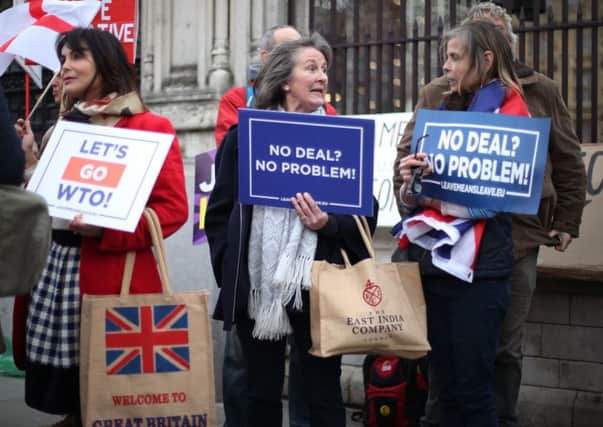UFU warns of ‘catastrophe’ over tariff-free RoI imports


It announced the plans yesterday morning, saying they were designed to kick in in the event of ‘no deal’ Brexit in 15 days’ time.
However, the government said the decision to allow Irish farmers free access to the Northern Ireland market was a “unilateral” one – there was no guarantee that the same tariff-free arrangement would apply to goods produced by Northern Irish farmers which were to be sold in the Republic.
Advertisement
Hide AdAdvertisement
Hide AdThe UFU response was stark: the plan threatened to “devastate Northern Ireland’s farming industry”.
The announcement yesterday was one of two major declarations by the government.
One set out the tariffs to be applied to goods entering the UK from the EU’s 27 nations in the event ‘no deal’ became a reality. The tariffs mainly apply to agricultural goods.
The other major declaration was that these tariffs will not apply to goods moving from the Republic of Ireland to Northern Ireland.
Advertisement
Hide AdAdvertisement
Hide AdThe government also said there will be virtually no checks applied to such goods.
This was being done, it said, in order to ensure “no return to a hard border”.
But UFU president Ivor Ferguson said it was “further proof that a no-deal Brexit would have catastrophic consequences for Northern Ireland”, likening it to “walking off an economic cliff”.
He said: “We have very real concerns about the proposal for a 0% tariff on agricultural goods coming from the Republic of Ireland into Northern Ireland and the differential treatment with RoI and GB trade where tariffs will apply. This would drive down prices and hit producers here...
Advertisement
Hide AdAdvertisement
Hide Ad“It’s unlikely the EU would offer the same zero tariff to Northern Ireland or the UK as a whole. This is why we have called for reciprocal tariffs. Whatever the EU applies, the UK should apply in return.”
Mr Ferguson also said he and colleagues were “shocked” the government has only now published details of its approach to ‘no-deal’ tariffs, with little over a fortnight to go before March 29.
The Agri-Food Alliance – an umbrella group of industry bodies including NI Food and Drink Association, NI Poultry Federation, and more – said it shows ‘no deal’ could well be a “a fatal blow to indigenous food production”.
It said: “These proposals could give the EU unfettered access to Northern Ireland, and therefore Great Britain, whereas Northern Ireland producers will not be able to freely export to the EU.
Advertisement
Hide AdAdvertisement
Hide Ad“Agri-food supports £1 in every £6 in the Northern Ireland economy, employing some 100,000 people.
“A ‘no-deal’ Brexit on these terms would be devastating. It would crush our farming base, destroying family businesses within weeks and would decimate investment leading to closures and job losses.”
Although the government set out the tariffs EU countries would face when exporting to the UK, the exact rates for agriculture are extremely difficult to calculate. Instead of being set at a simple flat rate, they are set as a proportion of the EU’s ‘most favoured nation’ rate – something which can vary.
However, other EU goods coming to the UK will face a flat rate in the event of ‘no deal’, most notably a tariff on finished cars and buses of 10.6% and 12.6% respectively.